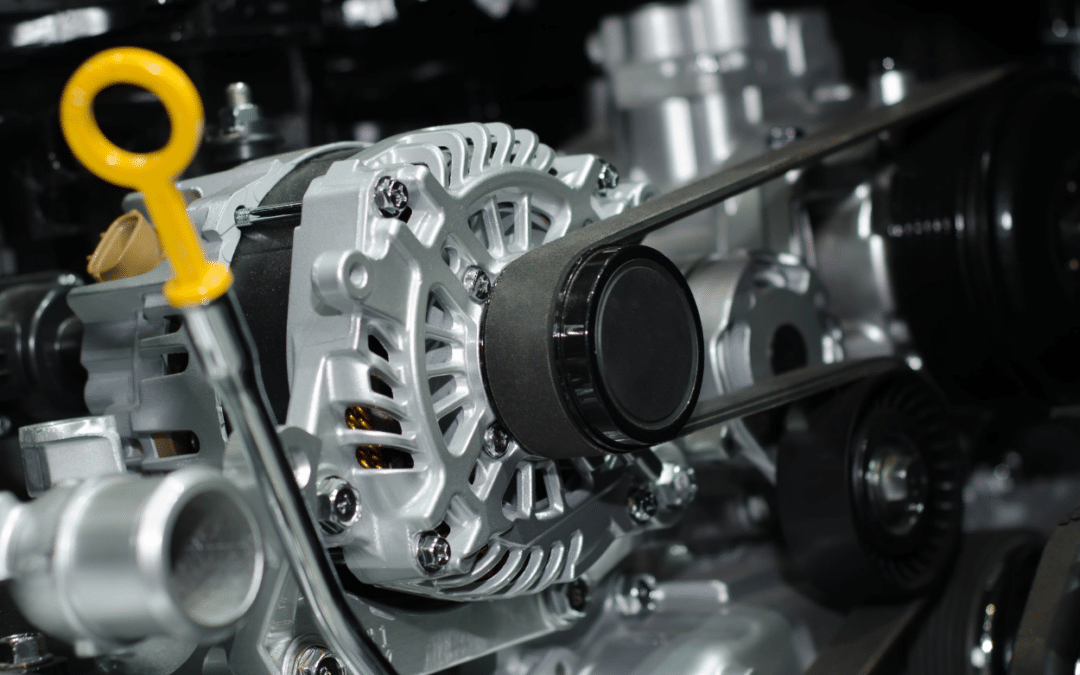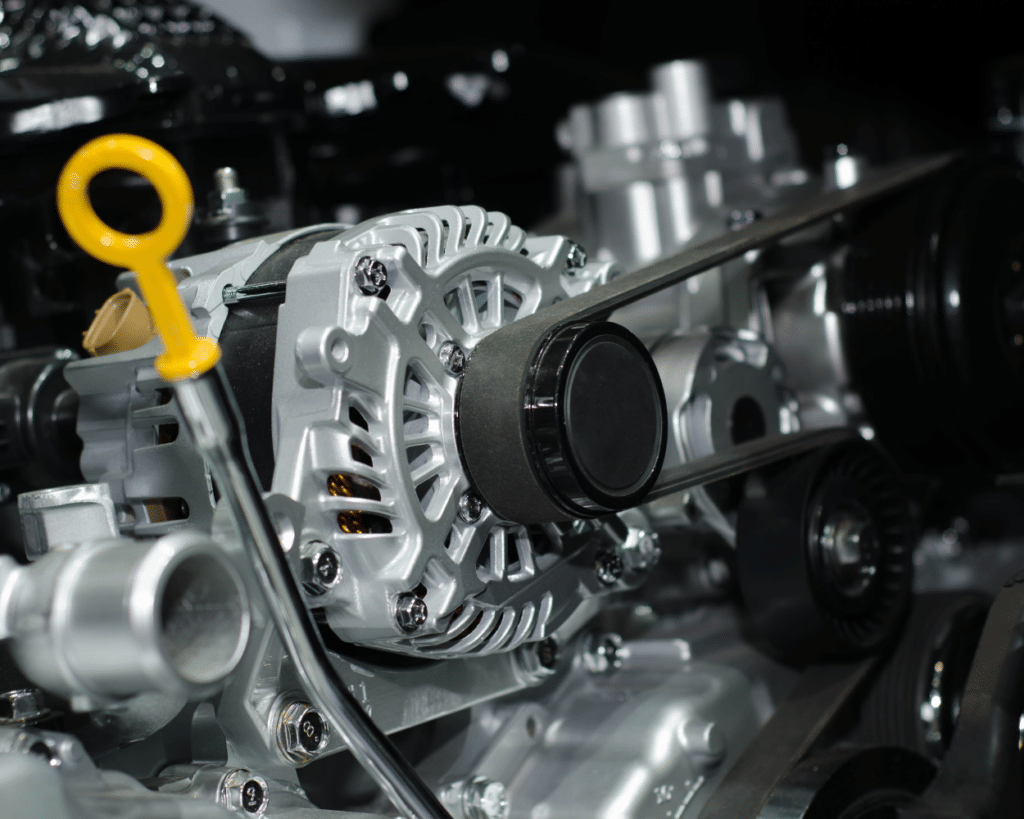If your car has been acting strange lately, you might be dealing with an overcharged alternator. If left unchecked, it can result in serious consequences such as battery damage and electrical system failure. At Express Auto Repair & Tires, we’ve seen how an overcharged alternator can lead to big problems for drivers. The good news? There are simple ways to fix it and prevent costly damage.
Let’s examine what causes an alternator to overcharge, how to spot the warning signs, and the best solutions to protect your car.
What Causes an Alternator to Overcharge?
An overcharged alternator happens when it produces more voltage than it should. Typically, the alternator generates power in the 13.5 to 14.5 volts range. When it goes above this range, it starts to overcharge. Here’s what can lead to this problem:
Faulty Voltage Regulator
The voltage regulator is like a control panel for your alternator. It ensures the alternator produces just the right amount of power. If it malfunctions, the alternator might create too much voltage, causing an overcharge.
Wiring Issues
Faulty wiring or loose connections between the alternator, battery, or voltage regulator can send the wrong signals, making the alternator think it needs to work harder. This can result in overcharging.
Bad Ground Connection
Can a bad ground cause an alternator to overcharge? Yes! A poor ground connection can confuse the electrical system, causing the alternator to deliver more power than necessary.
Internal Alternator Problems
Sometimes, parts inside the alternator, like diodes or circuits, fail. When this happens, the alternator can overcharge because it’s not working as it should.
Computer System Errors
In modern vehicles, the car’s computer helps control the alternator. If the computer system glitches or gets damaged, it might lead to an overcharging alternator.
How to Spot Warning Signs of an Overcharged Alternator
An alternator overcharging voltage can cause noticeable issues in your car. Here are some common warning signs:
Swollen or Leaking Battery
Too much voltage can make your battery overheat, causing it to swell or leak acid. If you notice a bloated battery, it’s a clear sign something’s wrong.
Bright or Flickering Lights
If your headlights or dashboard lights are brighter than usual or flicker randomly, the alternator might be producing too much power.
Burning Smell
An overcharged alternator generates extra heat, which can burn wire insulation or melt plastic components under the hood. You should never ignore a burning smell.
Weird Electrical Behavior
Overcharging can cause electrical issues, like radios cutting out, power windows acting up, or even your car stalling suddenly.
Dashboard Warning Light
Many cars have a battery or alternator warning light on the dashboard. If it lights up, your alternator might be overcharging or having another issue.
Frequent Battery Problems
If your battery dies often or won’t hold a charge, it might be due to an alternator overcharging battery.
Top 5 Solutions for an Overcharged Alternator
1. Inspect the Voltage Regulator
One of the most common reasons for an alternator overcharging is a faulty voltage regulator. The regulator controls how much electricity your alternator produces. If it stops working, the voltage can go too high. Replacing a bad regulator is an easy way to prevent the problem and save your electrical system from damage.
2. Check for Faulty Wiring or Loose Connections
Faulty wiring or loose connections can confuse your alternator, leading it to create more power than needed. Carefully check the wires connecting the alternator to the battery. Look for cracks, corrosion, or loose ends. If wiring issues are too complicated to handle, we can help at Express Auto Repair & Tires.
3. Test the Alternator Output Voltage
When the alternator output voltage is too high, it’s a clear sign something’s wrong. Use a multimeter to test your alternator. A healthy range is between 13.5 and 14.5 volts when the engine is running. Anything higher means your alternator might be overcharging and needs attention.
4. Watch for Symptoms of Alternator Overcharging
There are clear symptoms of alternator overcharging you shouldn’t ignore, including:
- A battery that’s swollen, leaking, or overheating
- Lights that are too bright or flicker
- A burning smell from the engine area
- Warning lights on the dashboard, including the check engine or battery lights
- Shortened battery life or repeated battery failures
If you’re wondering, “Why is my alternator overcharging?” It’s time to have it checked out by professionals like us. Don’t try to diagnose or fix an overcharged alternator on your own- it’s a complex issue that requires expert knowledge and tools.
5. Don’t Ignore Maintenance
Routine maintenance is key to avoiding issues like an alternator overcharging battery. Along with checking your alternator, keeping up with oil changes, brake checks, and electrical diagnostics can help your car run smoothly. At Express Auto Repair & Tires, we provide full-service care to keep your vehicle in top shape.
How to Avoid Problems with an Overcharged Alternator
The best way to protect your car is regular maintenance. If you notice signs, have your car checked immediately. An experienced mechanic can identify the problem before it leads to bigger issues.
At Express Auto Repair & Tires, we can inspect your alternator, check for faulty wiring or loose connections, and make sure your system is running correctly. We also offer other services like oil changes, brake repairs, electrical diagnostics, and more. By keeping your alternator and electrical system in good shape, you can dodge costly repairs and keep your car running smoothly.
If you’re dealing with an overcharged alternator, give us a call or stop by Express Auto Repair & Tires today. We’re here to help and get your car back on the road smoothly!
FAQs
What are the dangers of an overcharged alternator?
An overcharged alternator can overheat the battery, damage wiring, and harm parts like sensors or relays. Fix it immediately to avoid expensive repairs.
How can I check if my alternator is overcharging?
Test the voltage output with a multimeter. If it’s over 14.5 volts, it’s likely overcharging. Visit Express Auto Repair & Tires for accurate testing.
Can an alternator overcharge a battery?
Yes, alternator overcharging battery can overheat, warp, or damage your battery. If it looks swollen or won’t hold a charge, it’s likely being overcharged.
What happens if the alternator output voltage is too high?
High output voltage can fry wiring, harm sensors, and damage the car’s computer. Get it fixed fast to avoid expensive repairs.
Can regular maintenance prevent alternator overcharging?
Yes! Electrical system diagnostics and checking wiring or the voltage regulator can help. Express Auto Repair & Tires offers reliable maintenance services.
Call Us Today for Expert Help!
Don’t let an overcharged alternator damage your car. Visit Express Auto Repair & Tires for fast, reliable service. We specialize in alternator repairs, electrical diagnostics, and all-around vehicle maintenance. Call us now to book an appointment and keep your car running smoothly!



Recent Comments